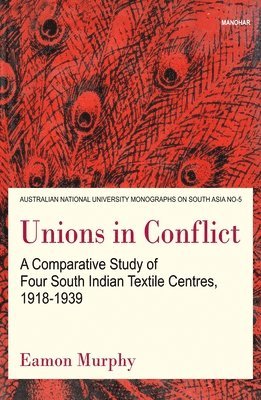Ny

Unions in Conflict: A Comparative Study of Four South Indian Textile Centres, 1918-1939
Eamon Murphy
Inbunden
1229:-
Tillfälligt slut online – klicka på "Bevaka" för att få ett mejl så fort varan går att köpa igen.
The present study deals with the development of textile unions between the period 1918-1939 in Tamilnad, the major Tamil speaking part of south India, which was part of the sprawling Madras Presidency.
The work explores the differences between labor organizations of four divergent mill centres situated in Madras city, Madurai, Ambasamudram and Coimbatore; and studies the unity and division, the successes and failures of the Tamilnad workers in trying to unite and organize effective trade unions.
The book reveals that the Madras workers have been among the best educated, most committed and the strongest trade unionists, despite the communal divisions among the Hindu, Untouchable and Muslim workers which hampered early union organization. In the temple city of Madurai, however, the workforce has been more deeply divided, partly along primordial loyalties of caste and religion resulting in rival unionism. In rural Ambasamudram, a similar trend to that of Madurai has been observed.
Coimbatore, on the other hand, offers an entirely different picture as traditional loyalties of caste or religion had little influence on union growth there. The labor struggle was unique in that it was waged between Indian workers and mainly Indian capitalists in contrast to the other centers, where British interests were dominant.
These comparative area studies furnish a new perspective on the history of the Indian working class. Moreover, the development of the textile unions has been considered in context of wider political and economic changes. The influences of international trade and capitalism and the growth of the Indian nationalist movement during the period 1918-39 has also been studied in light of the labor politics and organization of the time.
This book shall be valued by labour historians, trade unionists, politicians, and students of Indian history and economics.
The work explores the differences between labor organizations of four divergent mill centres situated in Madras city, Madurai, Ambasamudram and Coimbatore; and studies the unity and division, the successes and failures of the Tamilnad workers in trying to unite and organize effective trade unions.
The book reveals that the Madras workers have been among the best educated, most committed and the strongest trade unionists, despite the communal divisions among the Hindu, Untouchable and Muslim workers which hampered early union organization. In the temple city of Madurai, however, the workforce has been more deeply divided, partly along primordial loyalties of caste and religion resulting in rival unionism. In rural Ambasamudram, a similar trend to that of Madurai has been observed.
Coimbatore, on the other hand, offers an entirely different picture as traditional loyalties of caste or religion had little influence on union growth there. The labor struggle was unique in that it was waged between Indian workers and mainly Indian capitalists in contrast to the other centers, where British interests were dominant.
These comparative area studies furnish a new perspective on the history of the Indian working class. Moreover, the development of the textile unions has been considered in context of wider political and economic changes. The influences of international trade and capitalism and the growth of the Indian nationalist movement during the period 1918-39 has also been studied in light of the labor politics and organization of the time.
This book shall be valued by labour historians, trade unionists, politicians, and students of Indian history and economics.
- Format: Inbunden
- ISBN: 9789394262621
- Utgivningsdatum: 2025-01-01
- Förlag: Manohar Books

